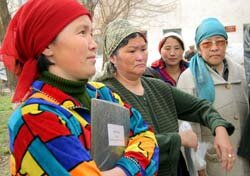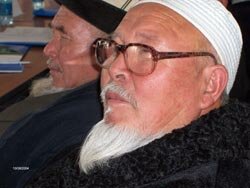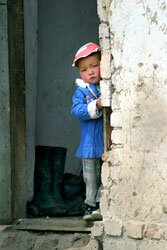
# 236
October 15, 2004
In this issue:
UNITED NATIONS DEVELOPMENT PROGRAMME (UNDP)
- Women participate and win: Results of Local Elections in Jalalabat
- UNDP HIV/AIDS programme: €œWe have to treat believers as our own family members€: Talas religious leaders joined to HIV/AIDS prevention efforts in Kyrgyzstan
- UNDP HIV/AIDS programme: HIV/AIDS Monitoring and Evaluation Seminar in Kashka-Suu
- UNDP HIV/AIDS programme: AIDS-service NGOs Initiates National Network
- UNDP HIV/AIDS programme: Psychosocial Counseling for HIV Testing Among Military
UNITED NATIONS CHILDREN€™S FUND (UNICEF)
- We fall short on promise to reduce child deaths
ORGANIZATION FOR SECURITY AND COOPERATION in EUROPE
- Fighting corruption by implementing best practices of good governance
UNITED NATIONS DEVELOPMENT PROGRAMME (UNDP)
Women participate and win: Results of Local Elections in Jalalabat
 As a result of the national local elections took place 10 October 2004, in Jalalabad oblast there were elected 1225 deputies, 125 out of them were women. As a result of the national local elections took place 10 October 2004, in Jalalabad oblast there were elected 1225 deputies, 125 out of them were women.
The peculiarities of the last elections was in an increase of the political activity of women, who regardless of the gender stereotypes widely spread in the country and especially in the South, take more and more active part in the social and political life of the country.
To a great extend this can be attributed to the UNDP activities in areas of poverty reduction, local self-governance and national governance development, conflicts prevention in the South as well as promotion of gender equality in politics, each of which includes the activities aimed at promotion of gender equality in all the spheres of life in Kyrgyzstan.
Within the framework of the project €œPromotion of gender equality in politics€ financed by the Swedish International Development Agency, which was launched in March 2004, the Swedish specialists in gender and politics in cooperation with local specialists work with active women all over the country, round table meetings calling them to more actively participate in the political life of the society, fight for the right to represent their interests in the highest decision levels, and not to afraid the misunderstanding and condemnation.
Along with the women, the project specialists actively work with men. This work is aimed at changing gender stereotypes and reconsideration gender roles, customary in Kyrgyz society. Besides, the project activities are focused at the mass media and the extermination of gender discrimination and stereotypes about women€™s participation in the political and in the social life.
As a result of the joint efforts of UNDP programmes in cooperation with civil society and the government of the Kyrgyz Republic, in Suzak rayon of Jalalabat oblast there were elected 19 women in contrast to the previous elections when there were elected 9. The majority of the elected women were the leaders and the members of the community organizations (CBO). Among them there are Turdukan Narimbetova, Leader of CBO €œAitoldu€, Zukhra Ahmedova, leaders of CBO €œNew Vita€, Mairam Azimjanova, leader of CBO Suzak aimdary€, Razia Amankulova, Leader of CBO €œMahkam€ and many others.
UNDP HIV/AIDS programme: €œWe have to treat believers as our own family members€: Talas religious leaders joined to HIV/AIDS prevention efforts in Kyrgyzstan
 €œWe should not delude ourselves that there are no officially registered cases of HIV infection in Talas, we have enormous work to do, because many of our people go outside of the province to work and can be exposed to different risks€, said imam Nordolot Izakeev at the seminar €œSocial mobilization of the state bodies and assistance of religious leaders in realization of the state programme on HIV/AIDS prevention€. €œWe should not delude ourselves that there are no officially registered cases of HIV infection in Talas, we have enormous work to do, because many of our people go outside of the province to work and can be exposed to different risks€, said imam Nordolot Izakeev at the seminar €œSocial mobilization of the state bodies and assistance of religious leaders in realization of the state programme on HIV/AIDS prevention€.
Seminar that took place on 8-9 of October in Talas with support of the State Commission in Religious Affairs of KR, Spiritual Management of Muslims of Kyrgyzstan and UNDP HIV/AIDS Programme gathered more than 30 religious leaders.
This seminar is the last in the series of seminars, conducted in all provinces of the republic. Thus, almost all imams of Kyrgyzstan received knowledge on situation with HIV/AIDS worldwide and in Kyrgyzstan and most importantly confirmed commitment to fight epidemics.
Religious leaders, representatives of National AIDS Center and NGO €œHadisy€ participated in the seminar as well.
Imam Uson Joroev emphasized that prevention starts in families. €œI always talk to my children on harm of smoking, alcohol and drugs. My children understand me and I am confident in my children. We have to treat our people as family and then they will care for own health.€
One of the practical suggestions came from imam Taalaibek Barpiev €œI suggest we should make a list of issues we can discus in mosques. For example one week we talk about hygiene and next week on harm of drugs and so on€.
Religious leaders play important role in HIV/AIDS prevention and formation of positive attitude towards healthy life style because they enjoy great authority among believers. That€™s why UNDP pays great significance to dialogue with religious leaders of Kyrgyzstan and distribution of correct information on HIV/AIDS situation in the country.
Lessons learnt during discussions with religious leaders will be taken into consideration at preparation to the second National Conference €œIslam Leaders and Theologians Against AIDS€, which is planned to be conducted by UNDP HIV/AIDS programme in December.
HIV/AIDS Monitoring and Evaluation Seminar in Kashka-Suu
On October 1st and 2nd, 2004 representatives from state organizations gathered at the resort centre of Kashka-Suu, to participate in a two-day seminar organised by UNDP on €œPlanning, Performance, Evaluation and Monitoring of Sectoral HIV/AIDS programmes€.
Under the current State Programme (2001-2005) seven ministries and three state committees with UNDP support have designed and implemented a set of activities in the area of HIV/AIDS prevention. The issue of monitoring and evaluating of sectoral programmes is a challenging task in this area. That is why it was put into the agenda for discussion in Kashka-Suu.
Exemplified by the programmes of each ministries and state agencies, this seminar contributed to growing understanding of what monitoring and evaluation is all about. In working groups, participants learnt to identify and formulate objectives following the need of their target groups. They also explored ways to identify and apply indicators, as well as get acquainted with certain tools of data collection. The seminar opened up the importance of integrating monitoring and evaluation in programme and budget planning.
Many of the participants confessed that existing knowledge in monitoring and evaluation was not sufficient. Government officials promised to share knowledge they got at the seminar with their colleagues. Focal points of ministries and agencies underlined that new skills will help to implement current programmes and elaborate activities for the up-coming state programme on HIV/AIDS prevention.
AIDS-service NGOs Initiates National Network
On September 27, 2004 the Association of AIDS-service NGOs presented the results of one-year activity and shared the plans for the coming year on development of the national AIDs-service NGO network.
In 2003 Association of AIDS-service NGOs under UNDP support launched a virtual network: www.volvox.in.kg united civil society organizations working in HIV/AIDS area in all regions of Kyrgyzstan. During this time, the website became €œa meeting point€ for sharing experiences and knowledge, news and events, new publications and information about grants.
Heat discussions and wise advices €“ one can find a lot useful at this website. In September 2004 UNDP HIV/AIDS Programme supported the 2nd phase of network development to introduce new approaches of cooperation between NGOs in different regions through Internet.
As Sezin Sinanoglu, UNDP Deputy Resident Representative noted in her welcoming speech since HIV epidemic remains to be extremely dynamic, growing and changing character, the Association can play a decisive role in Kyrgyzstan to counteract the epidemic.
Psychosocial Counseling for HIV Testing Among Military
€œI am much more aware now, that psychosocial consultation is a necessary component to humanize the medical process of HIV-testing€- commented a participant at the closing of a three-day seminar took place in Bishkek between 6 and 8 October 2004.
Targeting key medical professionals of Kyrgyz uniformed services this seminar was the first event led under UNAIDS/UNDP project on €œHIV/AIDS prevention among uniformed services of the Kyrgyz Republic.€
The seminar aimed at providing the military medical staff with the basis of psychosocial consultation €“before and after HIV testing. Through experiential learning activities, participants explored counseling techniques, verbal and non-verbal communication, orientated patient and many other necessary aspects.
It was also an opportunity to deepen accurate information on HIV/AIDS, as well as getting acquainted with approaches in information dissemination among the military. Participants recognized that €œpsychosocial consultation is a valuable tool to provide information€, moreover they valued the skills that they were given the chance to develop. €œThis seminar helped us to develop communication skills that I can undoubtedly apply in my personal life,€ said one of participants after the seminar.
For more information, please contact: Ekaterina Paniklova, Programme Manager, UNDP HIV/AIDS Prevention programme or Ashir Chikeev, Information/Communication Specialist, tel.: (996 312) 62-04-49, tel/fax: (996 312) 66 36 91, e-mail:
UNITED NATIONS CHILDREN€™S FUND (UNICEF)
We fall short on promise to reduce child deaths
 €œIt is incredible that in an age of technological and medical marvels, child survival is so tenuous in so many places, especially for the poor and marginalized€, said UNICEF Executive Director Carol Bellamy, launching Progress for Children in New York on October 7, 2004. €œIt is incredible that in an age of technological and medical marvels, child survival is so tenuous in so many places, especially for the poor and marginalized€, said UNICEF Executive Director Carol Bellamy, launching Progress for Children in New York on October 7, 2004.
New country-by-country data reveals alarmingly slow progress on reducing child deaths despite the availability of proven, low-cost basic life-savers such as vaccines and basic knowledge and skills that every person has a right to know to take care of his/her life and the lives of their children.
The CEE/CIS and the Baltic Region only managed to reduce its child mortality rate by seven points between 1990s and 2002, from 48 deaths before the age of five for every 1,000 births, to 41. Contrast this with the 20-point reduction in Latin America and the Caribbean.
In Central Asia, a child is three times more likely to die before his or her fifth birthday than a child in Central and Eastern Europe. The reports points out that in Kazakhstan and Uzbekistan, children are even less likely to reach their fifth birthday than they were in 1990.
Kyrgyzstan, according to the official statistics, has made some 2.4 % annual rate of reduction over 1990-2002. In 2003, the government agreed to adopt the WHO norm of live birth definition. That posed new challenges: medical personnel need to learn new skills, the medical administration has to find ways to improve facilities of maternity hospitals and data collection system. With UNICEF€™s support, the Government has achieved some progress. In 2004 Kyrgyzstan showed one of the best results in the region on the under-five-mortality rate: it has stagnated. However, there is still much to do.
UNICEF€™s publication Progress for Children provides analyses that every person €“ the President, the scientist or the grandmother €“ can use to near the day when nations will be judged not by their military or economic strength, nor by the splendour of their capital cities and public buildings, but by the well-being of their children.
For additional information, please contact: Galina Solodunova, UNICEF Communications Officer. Phone: (996 312) 611 211 (ext.139); 611 224...7, e-mail:
ORGANIZATION FOR SECURITY AND COOPERATION in EUROPE
Fighting corruption by implementing best practices of good governance
BISHKEK, 14 October 2004 - Fighting corruption by implementing best practices of good governance is the focus of a workshop being held in Issyk-Kul on 14 and 15 October.
The workshop, entitled "Anti-corruption, national and international legal instruments and best practices," is being attended by representatives of governmental structures, judiciary, parliament, law enforcement bodies, international and non-governmental organizations as well as experts on the subject.
"Learning about international conventions and legal tools and using them is a real step forward in implementing national good governance practices," said the Head of the OSCE Centre in Bishkek, Ambassador Markus Muller.
Kyrgyz Vice Prime Minister, Joomart Otorbaev, said: "We rely on the support of donor-organizations in order to ensure full implementation of anti-corruption conventions and good governance practices in Kyrgyzstan".
Representatives of the Council of Europe, the Organization for Economic Co-operation and Development (OECD), the United Nations Office on Drugs and Crime (UNODC) as well as international experts from Italy, Lithuania, Singapore and the United States will present national and international legal instruments and best practices in combating corruption.
"It's important to consolidate the efforts of international organizations, governments and civil society who are willing to fight corruption together in order to achieve real results for the better of people," said Zhuldyz Akisheva of the UNODC Regional Office in Central Asia.
At the end of the workshop draft recommendations and a plan of action will be submitted to the respective Government authorities in Kyrgyzstan.
The workshop was organized by the OSCE Centre in Bishkek together with the State Secretariat of the National Council of Good Governance of the Kyrgyz Republic and the Office of the OSCE Co-ordinator for Economic and Environmental Activities in Vienna.
For more information, please contact: Marina Dmitrieva, National Public Relations and Media Officer, OSCE Centre in Bishkek, 139 St. Toktogula, 720001, Bishkek, Kyrgyzstan. Tel.: +996 (312) 66-50-15,+996 (312) 66-41-26 Email:
|

